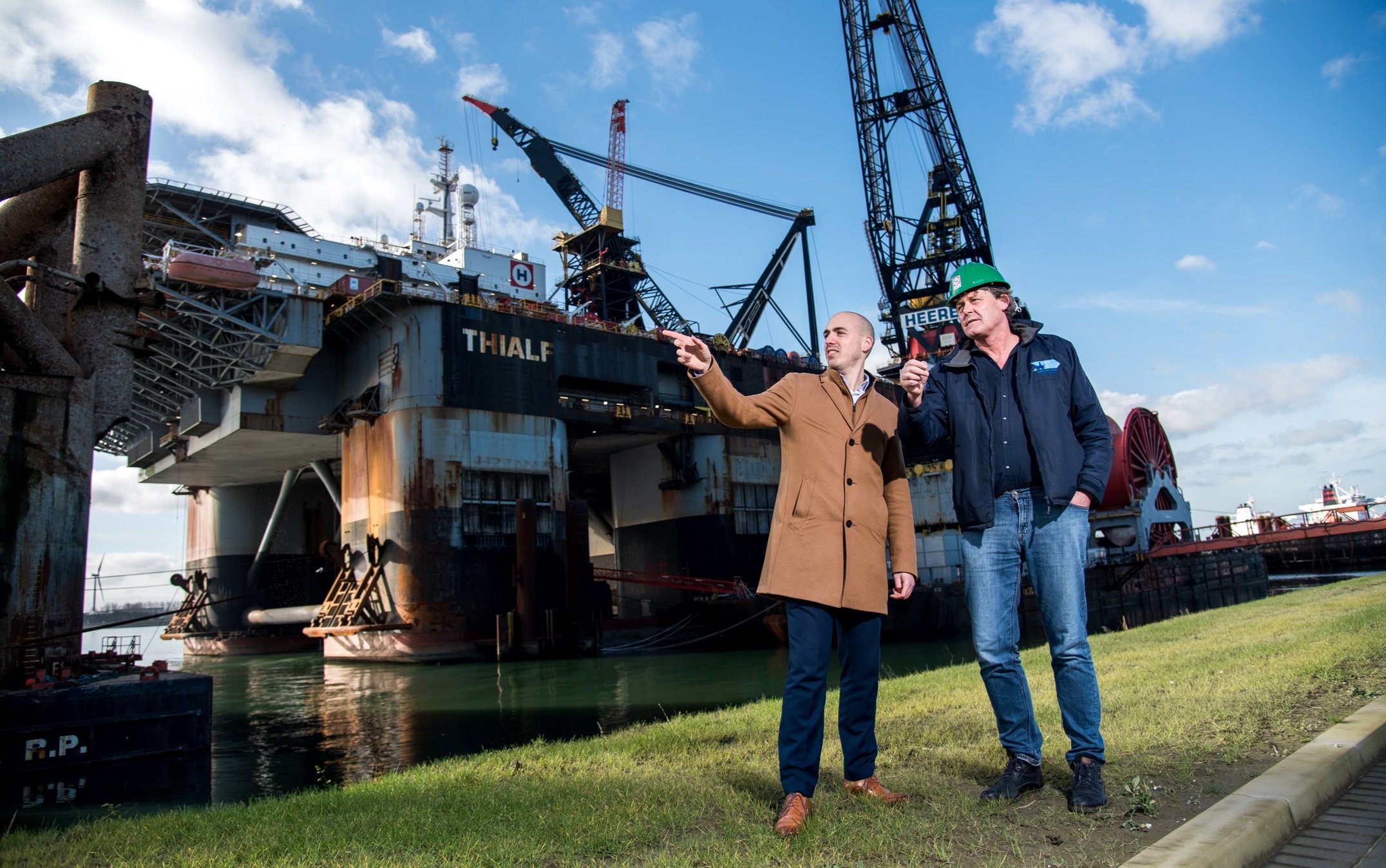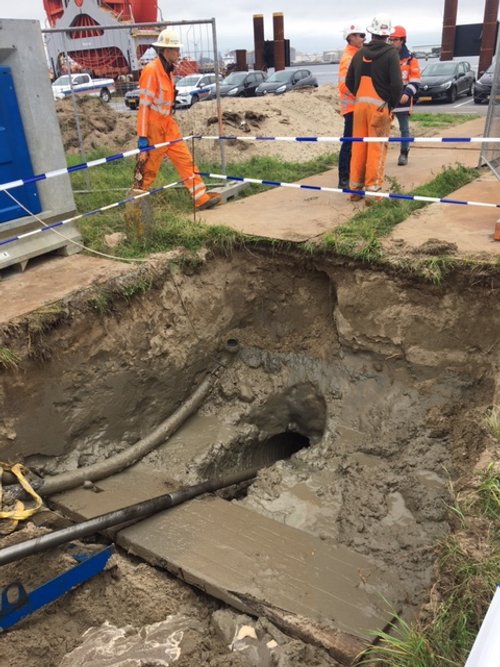Shore Power Calandkanaal
Building the biggest shore power connection in the offshore industry (to date)
Summary - Sustainable Ships Expert Vincent Doedee was responsible for the creation of the shore power connection for Heerema in the Calandkanaal. This single project kicked shore power developments in the Port of Rotterdam into high gear and showed the maritime industry that electrifying (sea going) vessels with green energy is not just a pipe-dream, it is the norm.
About the Project
The largest ‘offshore plug’ in the world
When moored in Rotterdam, Heerema’s vessels will be connected to wind turbines on the Rozenburg headland. This ensures that all noise and emissions associated to these moored vessels will be virtually eliminated.
The project itself is the first of its kind in the offshore industry and was established in collaboration with Eneco and Port of Rotterdam, supported by the city Council and InnovationQuarter. The installation will provide 20 MW of power, saving roughly 15,000 metric tons of CO2 each year. The reduction of emissions will benefit Heerema fleet personnel as well as local residents.
Technical challenges included cable laying to and from the windturbines and connecting to the vessels, pre-magnetization of (old) equipment and ‘current leakage’ in a wet environment.
In the future, not only Heerema’s fleet but other vessels could be connected as well. Contact us and comment below to connect your vessels in the area.
It all starts with an idea
Our story begins when a sustainability engineer meets a Captain.
Late 2016, in the Heerema main office in Leiden, a young and ambitious sustainability engineer looked at his screen. He was working on something he heard during a brainstorm session, an idea to power the largest vessels in the world by means of electricity. The idea was called ‘Shore Power’.
This was a time in which most people in the offshore industry did not think much about sustainability. The ink on the Paris Agreement was still wet, and the offshore industry was not even mentioned in it. Nonetheless, our sustainability advisor came across an idea that could potentially solve many issues that Heerema had at the time. Shore power could not only virtually eliminate all emissions when moored, it would also eliminate noise coming from the vessels. Thinking how on Earth he could pull this one off, our sustainability advisor heard a voice saying:
“Why don’t we connect those windturbines to our vessels when they are moored in the Calandkanaal?”
He turned his head, surprised to hear someone speak out exactly what he was trying to figure out on his own. It was ‘the Captain’. A well-respected figure, much admired by everyone for his compassion and honesty, walking around as if he owned the place (which he affectionately called his ‘clubhouse’). “What’s that, you say?”, he asked to the Captain. That was the moment their journey started.
The idea lights a spark
For the first year, the sustainability engineer and the Captain worked together without much help from outside the company. People are quite skeptical of abstract ideas and it is hard to convince them of something when you do not have much to show for. What needed to be done first was to work out the technical details of something that had never been done before: connecting the largest vessels in the world to shore power. True, shore power itself is nothing new.
In 2017, the young engineer actually visited the Stena Line site in Hoek van Holland, where they converted their fleet for shore power in 2012 already. The sheer size of the vessels from Heerema however, and the intermittent power requirements of the cranes made for some extraordinary technical challenges. Regardless of these challenges, the engineer and the Captain worked tirelessly to convince others of their idea.
Despite their best intentions and hard work, it seemed the idea did not take off. Most people start doubting themselves when things are not going the way you were hoping for them to go. Though this was certainly the case for the engineer and the Captain at some low points, they also had a kind of stubbornness that made them push forward. They believed shore power was the right thing to do, so they simply kept going and removing obstacles one by one. After about a year, they found their secret sauce.
The spark fuels a dream
The spark ignited a fire in the beginning of 2018 when our duo found their ‘sticky’ message. Showing people that the amount of emissions saved was equal to that of the entire environmental zone of Rotterdam per vessel seemed to do the trick. This message opened peoples’ eyes to the enormous potential of shore power in the energy transition and made it easier for others to follow. It was at this time when the engineer and the Captain found out they should not have done it on their own. As with many of these kinds of complex challenges, you need to seek the help of others who share the same cause and our willing to help. And helped they were.
Through InnovationQuarter, contact was made with the Port of Rotterdam and Eneco. It took Eneco only a single meeting to be convinced of the great potential that shore power had to offer in the energy transition. In May 2018, they were on-board. This made convincing the Port of Rotterdam a whole lot easier. On July 10, 2018, things became official. A memorandum of understanding was signed between Heerema, Eneco and the Port of Rotterdam.
For the sustainability engineer and the Captain, this was an amazing accomplishment. Over a year of hard work was validated when it seemed these partners all committed to making shore power a reality. It turned out however, that this was not the beginning of the end, but the end of the beginning.
The dream becomes a reality
A full year of engineering work ensued. From 2018 to late 2019, Heerema and Eneco had to figure out the technical details and close the business case. For every young engineer this is happy work to be sure: transforming the largest and meanest vessels in the offshore industry from fossil to green energy is something that makes a sustainability engineer’s heart tick. Sometimes it felt however that their answers raised more questions instead of solving them.
Some key issues involved communicating with the local grid operator as it was quite a bureaucratic organization, designing the e-house in such a way that the local population agreed, and simply connecting the power to the vessel. At the time, there was simply no plug available that could traverse the distance and height from shore to vessel. It turned out that once again, everything that Heerema does is truly the biggest in the world.
With the combined efforts of everyone involved, these commercial, political and technical challenges were resolved. On October 24, 2019 the contract between Heerema, Eneco and the Port of Rotterdam was signed. Heerema was to be the first customer of ‘Shore Power BV’, a company owned by Eneco and Port of Rotterdam, dedicated to providing shore power for all shipowners. At this point, there was no way back for everyone involved. The dream had become a reality. At least on paper.
Reality comes online
Despite the pandemic and several technical challenges during cable-lay, the largest ‘offshore plug’ has been built and is nearing completion at the time of writing. The dedicated people of Heerema, Eneco, Siemens and all subcontractors involved have pushed on relentlessly, showing true dedication and commitment to their jobs. It is truly amazing to see how passionate everyone has worked on this project over the past year, from the moment of signing the contract to the moment the vessel was electrified.































